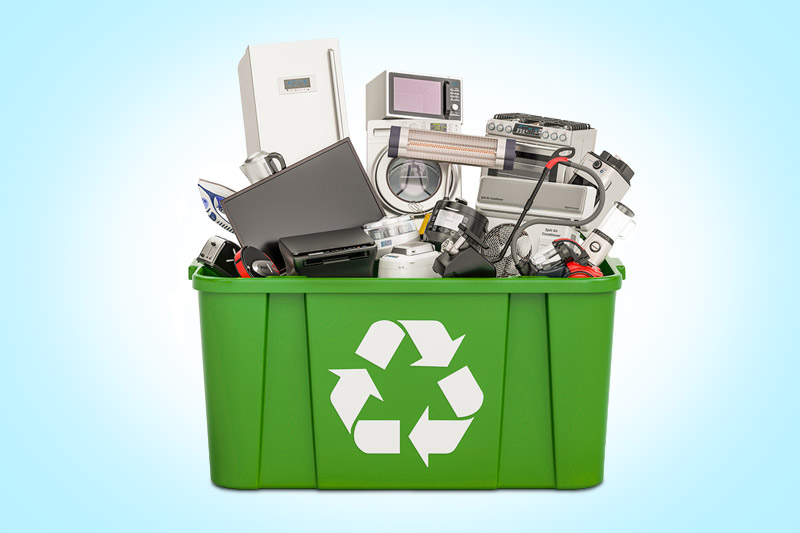R2 Certification Electronic Devices Recycling: Your Assurance for Liable Disposal
Wiki Article
Elevate Your E-Waste Management With R2 Certification: a Comprehensive Review
In the world of accountable electronic waste monitoring, the relevance of executing reliable methods can not be overstated. As modern technology quickly evolves, the demand for appropriate disposal and recycling of digital gadgets has come to be increasingly crucial. One secret method to boost e-waste management techniques is by achieving R2 accreditation. This qualification stands as a characteristic of excellence in the area, symbolizing adherence to stringent requirements that make certain environmentally sound practices. By exploring the advantages and procedures connected with R2 accreditation, a much deeper understanding of just how it can transform e-waste monitoring strategies arises, dropping light on a course in the direction of sustainability and moral disposal methods.Value of E-Waste Monitoring

When e-waste is not handled properly, these toxic substances can leak right into the community, triggering damage to wild animals and potentially entering the food chain, posing risks to human health and wellness. Moreover, the improper disposal of e-waste adds to contamination and greenhouse gas exhausts, exacerbating environment modification and environmental destruction.

Benefits of R2 Accreditation

Firstly, R2 accreditation boosts reliability by showcasing an organization's devotion to sustainable techniques. It assures customers, partners, and stakeholders that the company abides by strict standards for e-waste administration - r2 certification. This integrity can result in boosted trust fund and boosted relationships with customers that prioritize environmental obligation
Second of all, R2 certification assists alleviate risks connected with improper e-waste disposal. By complying with the stringent standards stated by the certification, companies can lessen the probability of data breaches, ecological contamination, and lawful consequences. This aggressive approach safeguards the business's reputation and minimizes possible responsibilities.
Last but not least, R2 accreditation shows a dedication to ecological stewardship - r2 certification. By sensibly handling electronic waste through licensed procedures, companies add to the conservation of sources, decrease of contamination, and promotion of a circular economic climate. This dedication not only profits the environment but also lines up with evolving customer assumptions for sustainable business practices
R2 Qualification Process Summary
Having established the advantages of R2 qualification in advertising integrity, threat reduction, and ecological stewardship, it is necessary to currently lay out the thorough process involved in getting this accreditation. The R2 qualification process starts with an extensive review of the company's functional plans and procedures to make sure conformity with the R2 requirement. This initial evaluation is crucial in identifying any type of gaps that need to be resolved before proceeding better.When the company's techniques straighten with the R2 typical demands, an independent third-party auditor conducts an on-site audit to review the implementation and effectiveness of these methods. This audit consists of a comprehensive evaluation of documents, interviews with team, and physical inspections of centers to verify compliance.
Complying with an effective audit, the company receives a certification choice based on the auditor's searchings for. If accepted, the company is approved R2 accreditation, showing its commitment to responsible e-waste monitoring. It is necessary to keep in mind that keeping R2 accreditation moved here calls for recurring compliance with the requirement's needs and periodic audits to guarantee ongoing adherence to ideal practices in e-waste recycling and disposal.
Secret Standards for R2 Conformity
A vital facet of attaining R2 compliance is guaranteeing that all digital waste (e-waste) handling centers fulfill stringent environmental and security requirements. To abide by R2 needs, organizations must follow crucial requirements that concentrate on liable e-waste monitoring techniques. These criteria include executing a documented environmental, health and wellness, and security administration system, making sure the safe handling of data-containing tools, and performing thorough downstream due diligence to track the last location of e-waste products.In addition, R2 conformity requires the appropriate testing, refurbishment, and recycling of electronic tools to expand its valuable life and decrease ecological effect. Facilities seeking R2 certification must additionally focus on worker health and wellness by giving needed training, personal protective tools, and a secure workplace. Additionally, keeping Bonuses thorough records of e-waste processing tasks and regularly undertaking audits by recognized accrediting bodies are vital parts of demonstrating ongoing conformity with R2 requirements.
Impacts of Lasting E-Waste Practices
The application of lasting e-waste methods in accordance with R2 conformity not only ensures ecological and safety criteria are satisfied but likewise considerably influences the general lifecycle of digital products. By adhering to R2 requirements, electronic waste administration processes end up being more reliable, reducing the ecological footprint of digital products. Lasting e-waste practices help with the proper disposal of electronic parts, guaranteeing that hazardous products are managed properly and do not wind up contaminating the environment.In addition, lasting e-waste techniques can add to work production in the recycling and repair fields, cultivating financial development while advertising ecological obligation. Generally, the fostering of lasting e-waste methods under R2 accreditation serves as an important step towards achieving a more environmentally lasting electronic devices sector.
Final Thought
Finally, executing proper e-waste management techniques is critical for ecological sustainability and resource conservation. R2 certification plays a vital duty in making sure accountable handling and disposal of electronic waste. By sticking to the rigid criteria stated by R2 criteria, organizations can not only decrease their ecological influence yet additionally add to a more lasting future for generations to find.One key approach to raise e-waste management techniques is by achieving R2 certification. By discovering the benefits and procedures connected with R2 certification, a much deeper understanding of exactly how it can change e-waste administration approaches arises, shedding light on a course towards sustainability and moral disposal practices.
The R2 qualification process starts with an extensive review of the organization's functional policies and treatments to ensure conformity with the R2 standard. If authorized, the company is given R2 qualification, demonstrating its commitment to liable e-waste management. Generally, the adoption of sustainable e-waste techniques under R2 certification serves as a critical this link step in the direction of attaining a more ecologically lasting electronics market.
Report this wiki page